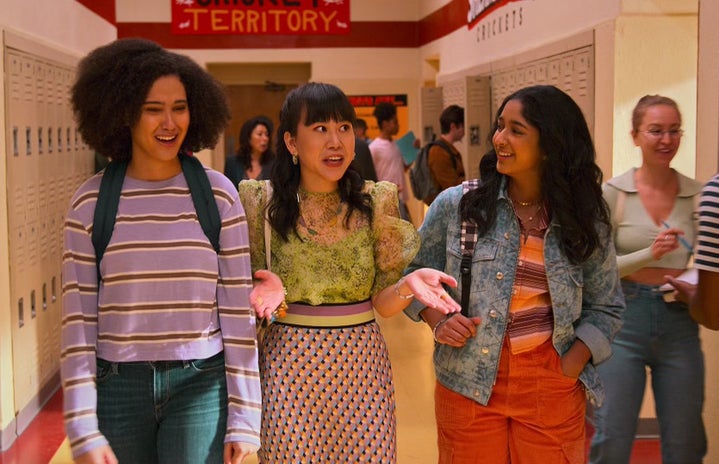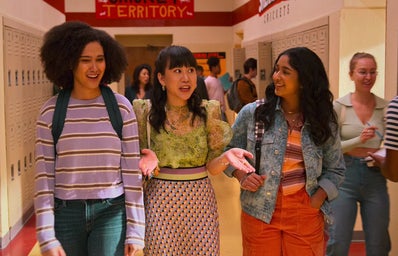I’m sure many of us are familiar with the popular Netflix series “Never Have I Ever,” written and produced by the one and only Mindy Kaling. The show revolves around a young South Asian teen’s life journey and focuses on themes such as dating, school, grief, friendship, etc. To most people, it seems like your typical teenage, coming-of-age show that sheds light on the struggles and quirks of adolescence and young adulthood. However, if you’re a South Asian woman like me, you’ll understand that the themes travel far deeper.
Considering that there isn’t much South Asian female representation in the media, it’s often a huge deal when there is because girls like me can finally see people on screen who look like us. Since this kind of representation is so rare, every piece of media that offers it is heavily scrutinized. It’s imperative that directors and producers make careful and conscientious decisions when it comes to crafting these narratives and characters in order to avoid accidentally playing into misconceptions about a specific group of people.
“Never Have I Ever” has received a mixed bag of reviews regarding representation — many seem to dislike the way the show has portrayed South Asian women, while others find that they resonate with the characters. I personally am not inclined towards a specific stance, but I want to delve into what the show does well and what the show could improve upon.
What “Never Have I Ever” Does Well
Breaking Traditional Gender Norms
Due to the culture’s emphasis on traditional gender roles, South Asian women are often portrayed as submissive, timid people who aren’t very sure of themselves. However, by including a main character who’s rebellious, assertive, and bold, the show attempts to break this stereotype. Although the main character, Devi, makes questionable decisions, the point is that she’s willing to put herself out there to get what she wants, even if it means that she breaks a few rules here and there. She doesn’t feel the need to make herself small or hold back.
Undoing Common Stereotypes
At school, South Asians are usually stereotyped as uncool, unattractive, nerdy people who only care about achieving academic success. While this rings somewhat true for Devi in the beginning, other characters such as Aneesa and Des disprove this statement with their social presence. Aneesa and Des are portrayed as the “cool” South Asian characters, and are depicted as attractive and charismatic from the start. This decision emphasizes that the world is not black and white, and that South Asians can in fact be smart AND cool. Characters like this eliminate any confining boxes that they may typically be forced into.
What “Never Have I Ever” Could Work On:
Internalized White Supremacy Narrative
Nothing irks me more than when a South Asian character is portrayed as someone who craves external validation and despises their culture. It’s a harmful narrative that perpetuates internalized racism. For instance, Devi ends up with Ben Gross, who throws racial microaggressions at her throughout the show.
Many shows like this also work hard to disprove the idea that POC women are not attractive enough for white men. But, feeling the need to do so in the first place clearly indicates a lack of security and a desperate need for approval – both of which are unfairly projected onto these characters. Using this theme as a foundation for characters creates a power imbalance and automatically places South Asian women below white men, suggesting that they are supposed to crave the validation of a white man by default. South Asian women are worthy on their own, and certainly do not need a white male counterpart to complete them or enhance their worth.
Lazy Writing of Certain Characters
In my opinion, Devi is an incredibly nuanced and well-written character. However, I wish Des and Aneesa had more screen time. If you’re going to play around with different South Asian characters for the purpose of banishing stereotypes, all of their stories should be developed properly. It’s nice that the writers had the intention of disproving stereotypes, but if neither of these characters’ storylines are fully fleshed out, the show falls flat. I personally would’ve loved to see more of Aneesa in season 4.
Overall, I’d argue that “Never Have I Ever” provides ample representation for the South Asian diaspora, but, like any other show, there are areas of improvement to be reached. Representation is a tricky concept because it’s so subjective. While there are some commonalities among South Asian experiences, each person’s life is unique and cannot always be adequately captured by a singular piece of media. While it’s difficult to cater to every single South Asian audience member, it doesn’t mean we should settle for mediocre representation, especially when South Asians’ portrayal in the media can affect how people view them in real life. It’s crucial that we voice our concerns when we feel compelled to do so.
Analyses aside, I think “Never Have I Ever” is a funny, heartwarming show, as it has made me laugh, smile, and cry on multiple occasions.
What do you think about South Asian representation in “Never Have I Ever”? Let us know at @HerCampusSJSU!


